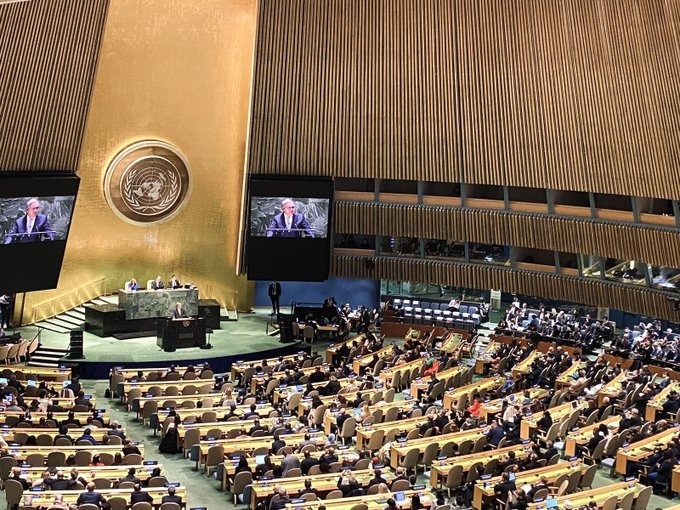The UN 2023 Water Conference ended on Friday with the adoption of the Water Action Agenda, a “milestone” action plan containing almost 700 commitments to protect water, humanity’s most precious global common good.
The News Agency of Nigeria (NAN) reports that the Minister of Water Resources, Alhaji Suleiman Adamu led Nigerian delegation to attend the three days event at UN headquarters in New York.
The Agenda sets out a series of action-oriented game changing commitments, from making smarter food choices to re-evaluating water as a powerful economic driver, and part of the Earth’s cultural heritage.
In his remarks at the closing ceremony, UN Secretary-General Antonio Guterres said the conference, and its 2,000 participants, forged an” ambitious vision’’.
“Your dedication to action and transformation is propelling us towards a sustainable, equitable and inclusive water-secure future for people and planet alike,” he said.
“This conference demonstrated a central truth: as humanity’s most precious global common good, water unites us all, and it flows across a number of global challenges.”
From protecting the spread of disease to fighting poverty, the natural resource also flows through the 2030 Agenda for Sustainable Development and its Sustainable Development Goals (SDGs) at a time when the world is grappling with climate change, water scarcity, and pollution.
“That’s why water needs to be at the centre of the global political agenda,” he said.
“All of humanity’s hopes for the future depend, in some way, on charting a new science-based course to bring the Water Action Agenda to life.”
Doing so translates into such forward-looking actions as developing new, alternative food systems to reduce the unsustainable use of water in agriculture, while launching a new global information system to guide plans and priorities to realize the SDGs.
New considerations include appointing a Special Envoy for water ahead of the SDG Summit in September, he said.
Lending multiple perspectives and expertise to navigate the challenges ahead, more than 2,000 government representatives, scientists, academics, civil society groups, indigenous peoples, members of the private sector, and youth delegates attended the conference.
In his remarks, Li Junhua, Under-Secretary-General for Economic and Social Affairs, said Water Action Agenda commitments cover a wide range of actions, from capacity-building to data and monitoring systems, to improving the resilience of infrastructure.
“This is just the beginning,” he said. “The online platform hosting the Water Action will remain open for submissions and available for all to view through the Conference website.”
Another key outcome of the conference will be a summary by the UN General Assembly President, capturing the many ideas, recommendations, and solutions to protect and support “our world’s lifeblood” that emerged during five interactive dialogues, four special events and hundreds of side events, he said.
Also speaking, General Assembly President Csaba Korosi said the $330 billion dollars in pledges made to buoy the transformative Water Action Agenda has the potential of unlocking at least $1 trillion of socioeconomic and eco-system gains.
“The outcome of this conference is not a legally binding document, but it still turns the page of history,” he said, in closing remarks. “You have reconfirmed the promise to implement the human right to water and sanitation for all.”
“That means reaching the millions who are not even aware of this conference.
“We will keep our ears and minds open to scientific evidence as we move forward to realise the transformation discussed,” he said.
Civil society and the private sector are at the heart of this transformation and “key to our success” he said, adding that they must be part of more inclusive partnerships and solutions.
“Today, we hold the pieces of a water-secure and more peaceful world in our hands,” he said. “Together, we can launch the transformation for a water-secure world, and these gamechangers can take us there.”


